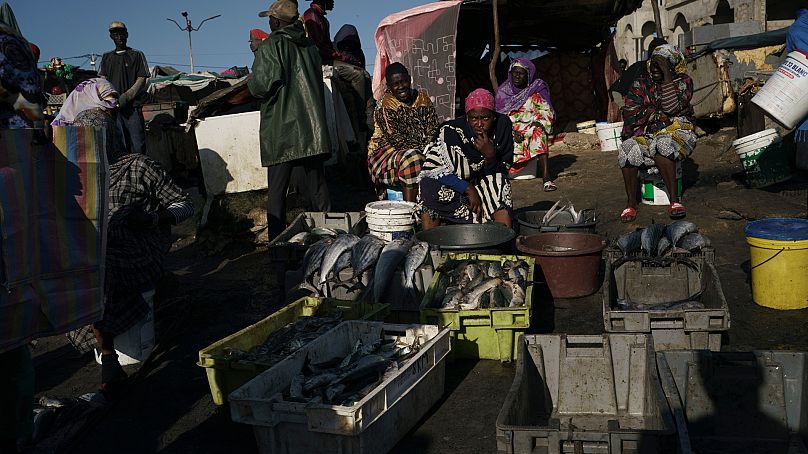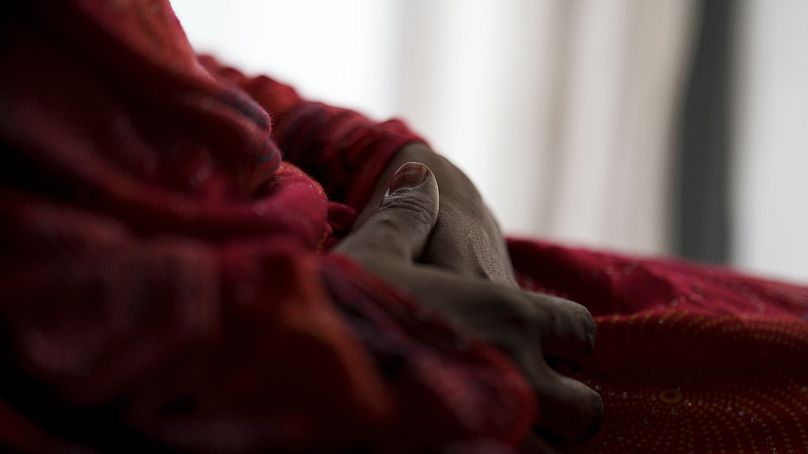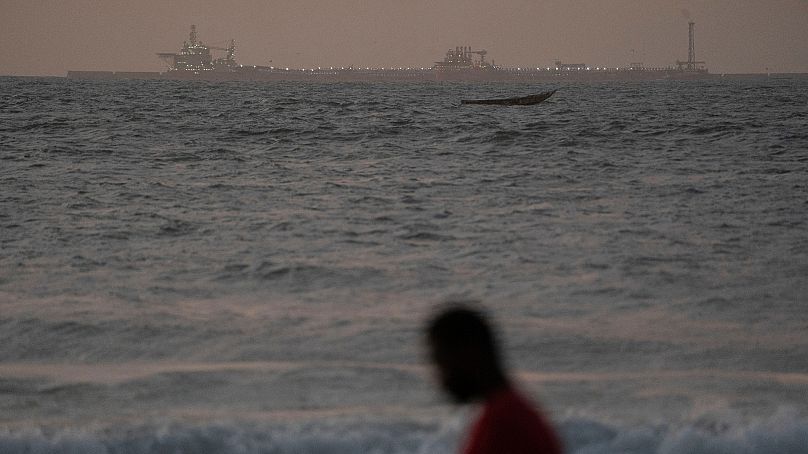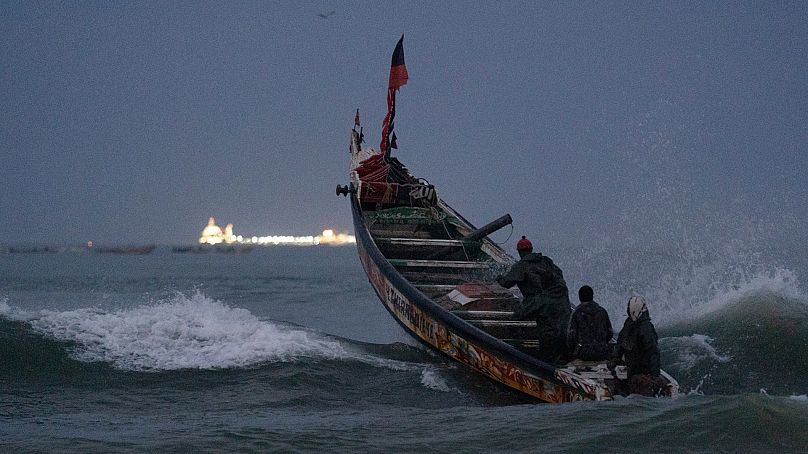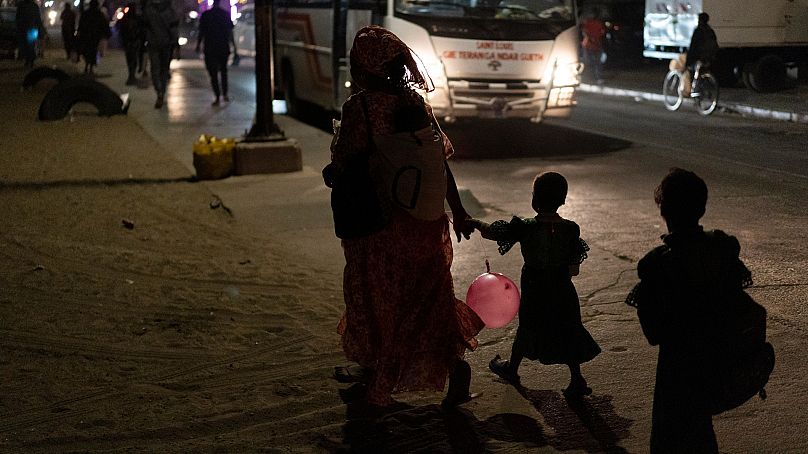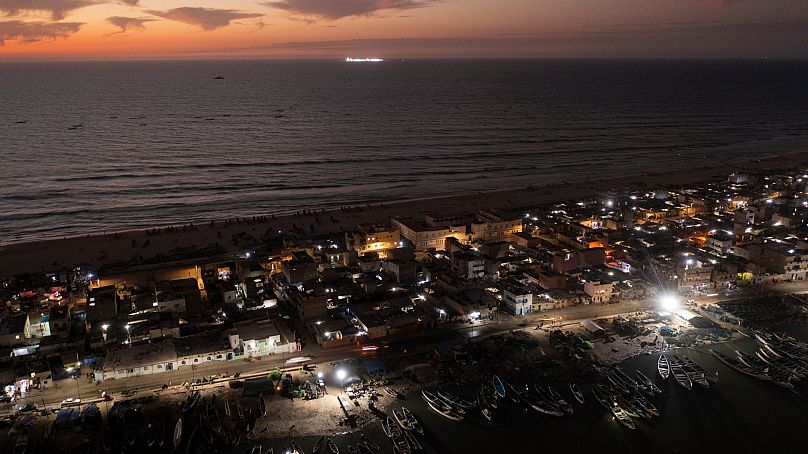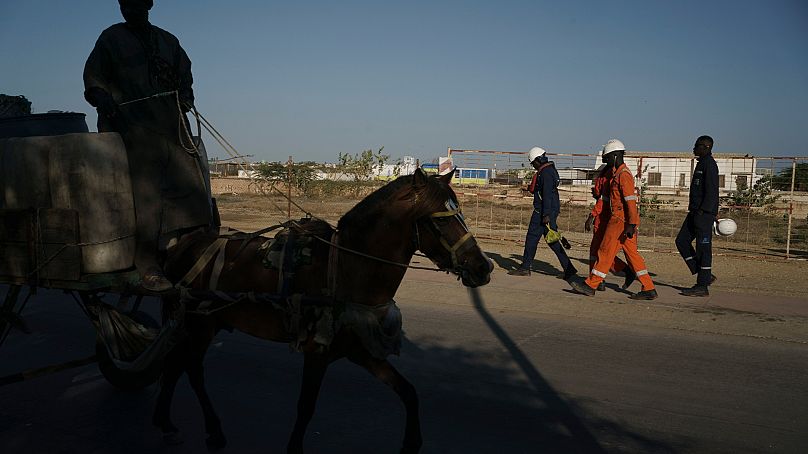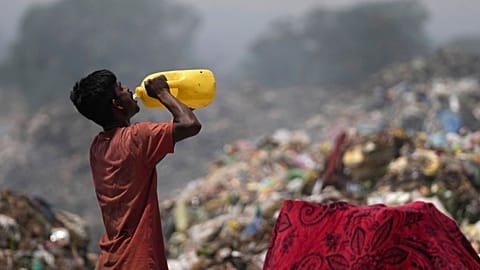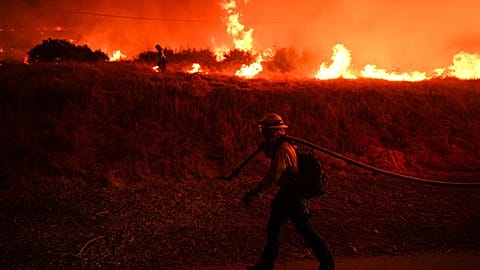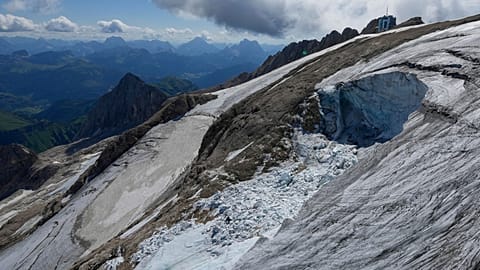A gas rig in the town of Saint-Louis has brought only a wave of problems, unemployment and more poverty.
When the gas rig arrived off the coast of Saint-Louis, residents of this seaside Senegalese town found reason to hope.
 ADVERTISEMENT
ADVERTISEMENT
 ADVERTISEMENT
ADVERTISEMENT
Fishing has long been the community's lifeblood, but the industry struggled with climate change and COVID-19. Officials promised the drilling would soon bring thousands of jobs and diversification of the economy.
Instead, residents say, the rig has brought only a wave of problems, unemployment and more poverty. And it's forced some women to turn to prostitution to support their families, they told The Associated Press in interviews.
What has happened in Saint-Louis?
To make way for the drilling of some 425 billion cubic metres of natural gas discovered off the coasts of Senegal and neighbouring Mauritania in West Africa in 2015, access to fertile fishing waters was cut off. An exclusion zone was created that prevents fishermen from working in the area.
At first, the restricted areas were small, but they expanded to 1.6 square kilometres - roughly the size of 300 football fields - with construction of the platform that looms about 10 kilometres offshore.
Soon the work was overtaking the diattara, a word in the local Wolof language for the fertile fishing ground that lies on the ocean floor beneath the platform.
With 90 per cent of the town's 250,000 people relying on fishing for income, the catch — and paychecks — were shrinking. Boxes of fish turned into small buckets, then nothing at all.
Saint-Louis, Senegal's historic centre for fishing, has faced many troubles over the past decade. Sea erosion from climate change washed away homes, forcing moves. Thousands of foreign industrial trawlers, many of them illegal, snapped up vast amounts of fish, and local men in small wooden boats couldn't compete. The COVID-19 pandemic shut down market sales of the tiny hauls they could manage.
The rig was the final straw for Saint-Louis, pushing it to the brink of economic disaster, according to locals, officials and advocates. The benefits promised from the initial discovery of energy off the coast haven't materialised.
Production for the liquified natural gas deal — planned by a partnership among global gas and oil giants BP and Kosmos Energy and Senegal and Mauritania's state-owned oil companies — has yet to begin.
Local people are being driven to desperation
Traditionally, many women make a living processing fish, while the men catch it. Sons, husbands and fathers spend weeks at sea. But with the restrictions, families couldn't feed their children or pay rent. They begged for leftovers from neighbours. Some were evicted.
Senegalese officials and the gas companies say people should be patient, as jobs and benefits from the gas deal will materialise. But locals say they've been stripped of their livelihoods and provided with no alternatives.
That's driven some women to prostitution, an industry that's been legal in Senegal for five decades but still brings shame for those who break cultural and religious norms.
For them, prostitution is faster and more reliable than working in a shop or restaurant — jobs that don't pay well and can be hard to find.
Four women who have started having sex with men for money since the rig came to town shared their stories with the AP on condition of anonymity because of the shame they associate with the work. They've hidden it from their husbands and families. They say they know many others like them.
The women explain the influx of cash as loans from friends and relatives. They know prostitution is legal but won't register with Senegalese officials. That would mean a health screening and an official ID to carry with them.
They're unwilling to legitimise work they say has been forced upon them.
For one family of seven, hitting bottom came when they were evicted. The father, a 45-year-old fisherman, lost his job. There wasn't enough food to feed the five children, ages 2 to 11.
The mother tried washing clothes and other jobs, but at less than $10 a day (€9), it wasn't enough. The family moved in with relatives and she had nothing to feed the children before school each morning.
"I'm obliged to find money through prostitution," she told the AP, her shoulders hunched and voice weary in a hotel room where she wouldn't be seen by her husband or friends.
"When we use the money, when my children eat the food I cook from that money, it's hard," she said.
What do those behind the project have to say?
The family and others in Saint-Louis learned of the gas discovery shortly after it was announced in 2015. Two years later, energy companies BP and Kosmos established a presence in both Senegal and Mauritania and partnered with Petrosen and SMHPM, the state-owned companies, respectively.
The Greater Tortue Ahmeyim project, as the overall deal is called, is expected to produce around 2.08 million tonnes of liquified natural gas a year, enough to support production for more than 20 years, according to the gas companies.
The total cost for the first and second phases is nearly $5 billion (€4.5 billion), according to a report by Environmental Action Germany and Urgewald, a German-based environmental and human rights organisation. The energy companies say phase one of the project is a multibillion-dollar investment, but didn't specify the amount.
Completion of phase one is expected by the end of this year when gas production should start, the companies said.
As early as 2018, Saint-Louis residents say, they were warned they would lose access to some of their favoured fishing waters. Installation of the breakwater, the area where the platform sits began in 2020.
BP is the operator and investor, owning nearly 60 per cent of the project in Senegal and Mauritania. The deal promises to create thousands of jobs and provide electricity to a nation where approximately 30 per cent of its 17 million people live without power.
The AP asked BP and Kosmos officials via email to comment on this story. The AP also sought comment about the companies' efforts to mitigate the effects of lost income in the community, their response to the women who say they've turned to prostitution, and other matters related to the deal.
In a statement to the AP, spokesman Thomas Golembeski said Kosmos had worked to build community relationships and that its employees visit Saint-Louis regularly to inform people of operations and act on feedback.
Golembeski emphasised the project will provide a source of low-cost natural gas and expand access to reliable, affordable and cleaner energy. He also cited access to a micro-finance credit fund established for the fishing community.
He referred other questions to BP, as the operator of the project.
BP sent prepared statements in response to the AP's inquiries. BP said it is engaging with the fishing communities in Senegal and Mauritania and trying to benefit the wider economy by locally sourcing products, developing the workforce and supporting sustainable development.
More than 3,000 jobs in some 350 local companies have been generated in Senegal and Mauritania, according to the company. BP also cited its work to renovate the maternity unit at the Saint-Louis Hospital and its help of 1,000 patients with a mobile clinic operating in remote areas.
But local officials, advocates and residents say they haven't seen many jobs or other options to combat the economic loss.
BP did not respond to follow-up questions. Neither BP nor Kosmos addressed the AP's questions about women who say they've been driven to prostitution.
'Going to the diattara now is like going to hell'
When locals talk about the hardships stemming from the gas project, they use just one word: Fuel. To them, it encompasses all they feel has gone wrong in the community.
The rig looms in the background off the coast. Easy to spot on a clear day, the lights on the platform shine at night and resemble a cruise ship docked offshore. The smell of fish still permeates Saint-Louis, as pirogues — small wooden boats — line the shores and horse-drawn carts carry the diminishing catch to town.
Seasoned fishermen who've weathered past storms and changes to the industry say the gas deal poses problems on a different scale, largely thanks to the exclusion zone. Smaller boats aren't equipped to venture past it, creating overcrowding in other fishing areas and depleting stocks for fishermen.
"Going to the diattara now is like going to hell," said Aminou Kane, vice president for the Association of Fishermen Anglers of Saint-Louis.
Since the area became inaccessible, fishermen are quitting, risking their lives migrating to Europe, or fishing illegally in neighbouring Mauritania where they face arrest, he said.
Kane, 46, is in the last group. He used to earn more than $1,000 (€900) a week fishing in Senegal and now makes roughly half that fishing secretly across the border, he said.
The mother who described turning to prostitution said her husband, too, tried to fish in Mauritanian waters. He left home to seek work there one year ago and she hasn't heard from him since.
Women are being driven to prostitution
Despite money coming in from prostitution, the women who spoke to the AP said they and others struggle to feed and shelter their families. Some have pulled children out of private school because they can't pay tuition.
The women can earn about $40 (€36) per client. Most work several times per week, in hotels or at the men's homes when wives are away. The women describe most clients as well-off Senegalese men, including business leaders and government officials, though some are from neighbouring or Western countries.
They find clients through local contacts. In some cases, the men are family friends to whom the women initially turned to for money or loans. But they say the men eventually insisted upon sex in return for the cash. Some of the men paid well at first, but not as much anymore.
In other cases, women go through intermediaries with established networks of men looking for prostitutes.
A woman who spoke to the AP on condition of anonymity said she's been running a business in Saint-Louis connecting men with prostitutes for seven years. She uses the name Coumbista in her work to protect her identity from her family and said she's seen her clientele drop in recent years, with young fishermen seeing a loss of income due to the gas project.
Simultaneously, she said, the number of women seeking sex work spiked, increasing her roster by half. She knows of nearly 30 women who started sex work because of gas-related financial woes, and because of general poverty. Most then do the work secretly, she said.
A 29-year-old who turned to her for help last year after her husband stopped fishing sneaks out of the house several times a week after putting their three children to bed. She tells her husband she's going to see friends or family.
"I am always afraid that I'll be seen by people who know me," she told the AP in the backseat of a car turning onto a quiet downtown street as she pointed to a nondescript building, one of two hotels where she has had sex with more than 20 men since she started.
"I never thought that one day I would be doing this."
The local government admits there has been an increase in illegal prostitution in recent years in Saint-Louis. Officials attribute the rise not directly to the energy deal, but to economic troubles overall.
"It's not only the fishermen population or the traders, but it's poverty in general that forces women into prostitution," said Lamine Ndiaye, deputy to the Saint-Louis mayor.
People's grievances about the rig are overblown and the community needs to be patient as it will take time to see the dividends, at least until after production, he said.
Fossil fuel extraction hits communities hard
Fossil fuel extraction hits communities particularly hard when the local economy depends on natural resources, according to environmental experts.
"If the land or sea that farmers or fishers rely on is poisoned and out of bounds, then their jobs and access to food have been robbed, and their communities can fall apart," said Dr Aliou Ba, head of Greenpeace Africa's oceans campaign and a Senegalese resident.
"That has happened in several countries in Africa, including in the Niger Delta. Oil and gas came in, contaminated the water, killed the fish and ruined many fishers' way of life."
He said the process is already playing out in Saint-Louis, and the community is suffering.
"If the authorities let this spread along our coast, hundreds of thousands of fisheries jobs will be at risk, and the millions of people in this region who depend on fish for protein will be threatened."
Shortly after the gas deal was signed, the companies noted there could be problems in Saint-Louis. A 2019 environmental and social impact assessment by BP and its partners said there were "a lot of uncertainties around the consequences for Saint-Louis fisherman of losing access to potential fishing grounds."
Still, it considered the intensity of the impact low, according to the report.
To mitigate economic consequences, the gas companies are evaluating options for a sustainable artificial reef project in Senegal and supporting 47 national apprentice technicians on a multiyear training program in preparation to work offshore and create jobs and supply chain opportunities, BP said in statements.
The technicians have been provided with 16 months of university training at Scotland's Glasgow Caledonian University and will gain internationally recognised qualifications, BP said.
BP did not respond to questions about whether it stood by the company's initial risk assessment.
Will the gas project create jobs in the future?
Papa Samba Ba, director of hydrocarbons for Senegal's gas and energy ministry, said the objective is that by 2035 half of all gas projects will go to local jobs, companies and services.
Phase one of the project will invest about 8.5 per cent of the gas into Senegal; however, the local gas market isn't set up yet and could take up to two years to be operational, he said.
There's also concern among industry experts that because Senegal doesn't have a history of oil and gas drilling, it won't have enough skilled labourers, despite the training.
Fossil liquified natural gas infrastructure provides few direct jobs, and those often go to experts from outside the community, not locals said Andy Gheorghiu, a climate consultant and co-founder of the Climate Alliance against LNG, a German-based organisation focused on the environment.
Some experts point to scenarios that have played out in the US. In the fishing village of Cameron in Louisiana, which operates gas export terminals, people haven't benefited from promised jobs and fishermen have been displaced from the community, according to locals.
"If you drive around Cameron Parish, home of three of these export terminals, you would not believe that these terminals have benefited the community in any way," said James Hiatt, who lives close to Cameron and is director of For a Better Bayou, an environmental organisation.
He added that the gas companies promised a new marina, restaurant and fishing pier, none of which have opened.
The AP emailed Venture Global, the gas terminal operator that residents say made the promises multiple times but received no response.
Environmental watchdogs say it would make more sense to invest in renewable energy. Senegal could create more than five times as many jobs in that sector yearly until 2030, compared with jobs in the fossil fuel industry, according to the Climate Action Tracker, an independent project that tracks government climate action.
But despite the suffering the community attributes to the gas, most say they don't want the companies to leave. What they want is for the situation to change.
"When I think of my former life and my life today, it's hard," said one 40-year-old woman, wiping away tears.
The mother of three said she had to resort to prostitution last year after her husband left the city and cut contact. She's pulled two of her children out of private school and sent them to public school, where the teachers sometimes don't show up for days.
"I hope someone can help me out of this situation," she said. "One in which no one would ever want to live."















